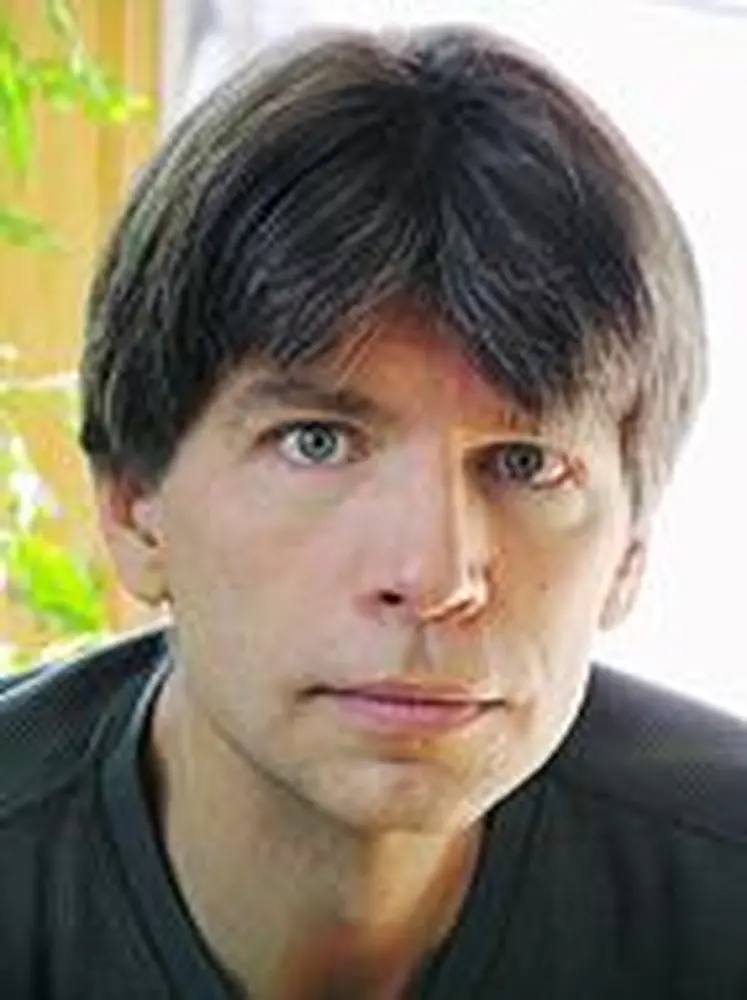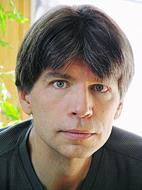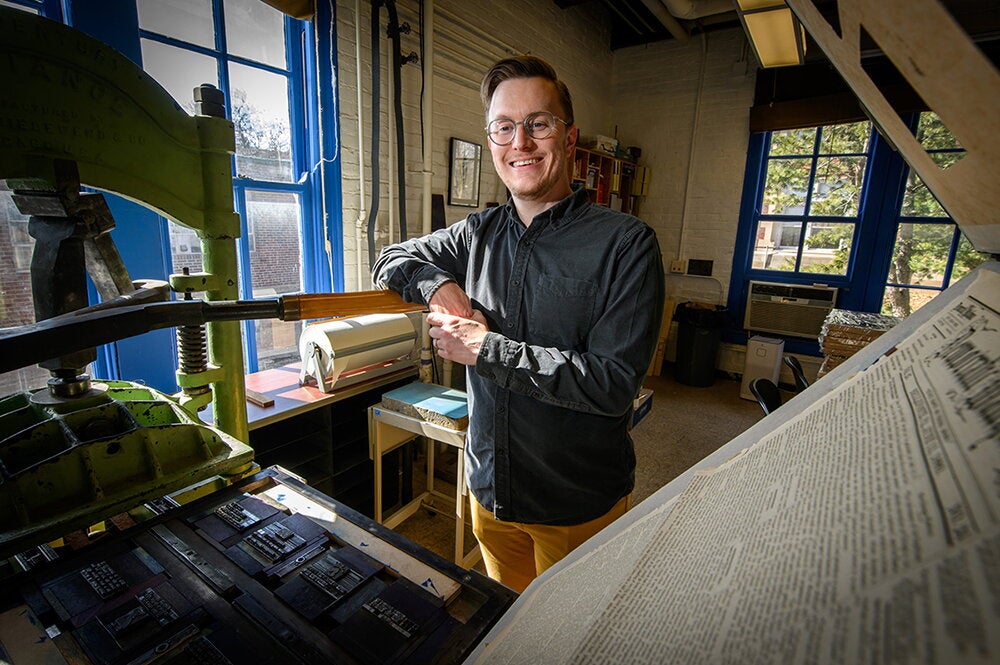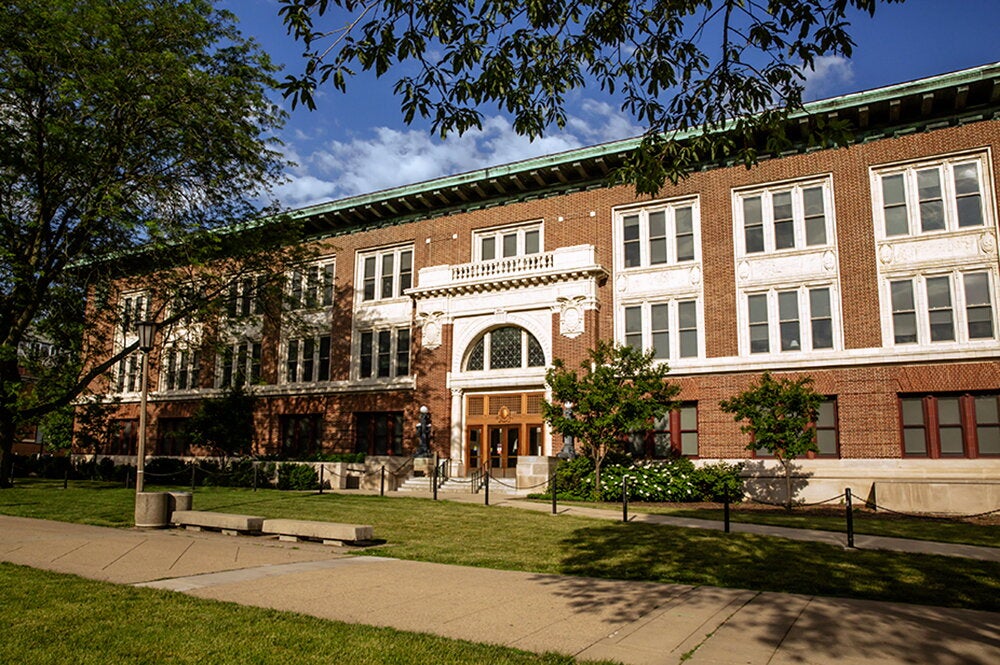

A novelist and writer-in-residence in LAS has won the 2006 National Book Award for fiction.
Richard Powers, the author of eight previous novels and a MacArthur Fellowship recipient, has won the literary award for his new novel, The Echo Maker. The award was announced November 15 in New York City.
Five authors were in contention for the National Book Award in the fiction category. It was Powers' second nomination; he also was a finalist in 1993 for Operation Wandering Soul.
Powers, the Swanlund Professor of English, offers his responses to questions about writing and his perspective on literary awards.
Q: What inspired you to write The Echo Maker?
A: Some years ago, in the early spring, I was driving across country to visit my mother, who lives in Arizona. I had been on the road for many hours when dusk started to fall, around central Nebraska. Off the side of Interstate 80, in a harvested cornfield alongside the Platte River, I suddenly saw this group of 3-foot-tall birds, and then another. Before I knew it, I was seeing a whole carpet of these creatures, as far as I could see.
For a brief moment, I thought I was experiencing highway hypnosis. In my excitement, I almost drove off the road. I pulled off and found a motel for the night, where I asked about the birds. I learned that this was the annual spring staging of the Sandhill cranes, an amazing ritual gathering involving half a million birds that included almost 90 percent of every migrating Sandhill crane on Earth.
Before that event, I probably couldn't have told a Sandhill crane from a wood stork. But having seen this spectacle, I became obsessed with the bird, and with bird intelligence. You have to imagine these large bipeds, gathering in these huge communities, literally singing and dancing with each other. There is just something so uncanny and recognizable about them. When I later learned that they mate for life and that they actually teach their young how to navigate the thousands of miles of migration by landmarks, they seemed both stranger and more familiar, nearer and farther from humans.
I continued to read about bird intelligence, and soon, about human intelligence. This reading went on for a couple of years, while I was writing my previous book.
When I came across a description about Capgras Syndrome-this strange misidentification problem in which people fail to recognize those other people who are closest to them-I began thinking in a broader way about this whole question of recognition and non-recognition, familiarity and strangeness. Can we see ourselves in other people? Can we see something of the human in other creatures? And that's where my story got started.
Q: Where did you study cranes and how did you study Capgras Syndrome?
A: The book's two major themes-ecology and neuropsychology-both have enormous bibliographies. I read continuously in both, during the four years it took me to write the book. Everyone knows about Oliver Sacks, the extraordinary writer who describes the case histories of various kinds of neurological deficits. But his work is just a small sample of what's out there. Other remarkable writers in this field include Todd Feinberg, Antonio Damasio, Paul Broks, Michael Gazzaniga, and John Skoyles.
The writing specifically on cranes is more limited, but intensely beautiful. Modern accounts all start with Aldo Leopold, of course. Peter Matthiessen's Birds of Heaven is a beautiful book. My obsession with cranes has the additional advantage of actually getting me out of the house on a couple of occasions. In addition to trips to Nebraska, I also made the trip to Jasper-Pulaski Refuge in Indiana, not far away, where tens of thousands of Greater Sandhills stop for a while on their way south in the fall. It's a wonderful experience, and it's taking place right now; I highly recommend it.
Q: How unusual is it for a book to be nominated for a National Book Award before it's been published?
A: It's unusual, but not unheard of. Because the prize runs from November to November, a small fraction of books published each year must be considered in galleys, if they're to be in the running. I will say that this is the first time I've ever received a major nomination before the book was in the bookstores, and it's a wild feeling.
Q: How would you characterize the role of memory in your fiction?
A: In some very basic way, all stories are about the shaping and selection of memory. More specifically, the topic has been extremely important to me in terms of writing about how we shape the self against the backdrop of remembered history. Whether I am writing about photography or game theory or genetics or artificial intelligence, I am always writing about the intersection of cultural and personal memory.
Q: Were you a bookish child? What were the first books that captured your imagination?
A: When I was young, books were like time machines and matter transporters. I couldn't get enough of them, and I sincerely believed that they could take me anywhere. Growing up, I probably read more non-fiction than fiction. Darwin's Voyage of the Beagle had a powerful effect on me when I was in grade school. It made me want to be a scientist, which I was certain I would be, all the way up to the age of 20.
But the very first book I can remember that cast an unforgettable spell on me was the child's picture book, Harold and the Purple Crayon. Everything Harold draws with his magic crayon actually comes into existence. How great is that? That book has remained with me throughout my life as a strange, first metaphor for the power of art and representation.
Q: Do you imagine you will ever jump genres and write, say, a biography or a monograph? If you plan to stick with fiction, what compels that decision?
A: I have often considered writing non-fiction, and I might easily end up doing so, someday. However, as I do the math, I just don't have enough years left for all of the fiction that I would still like to write. My compensation lies in exploring a kind of fiction that tries to incorporate some of the pleasures of non-fiction writing and literary essay. It's certainly easier for fiction to include other genres than it is for other genres to include fiction. I guess I'm a greedy writer, trying to find a form that will allow me to write about how everything connects to everything else.
Q: What happens to a writer (such as yourself) when the writer wins-or doesn't win-a major literary prize?
A: I've been amazingly lucky with public recognition for the books, both here and abroad. Of course, a prize doesn't make a book itself any better or worse. But it can bring the work to the attention of people who might otherwise never have come across it. Awards can be a very powerful encouragement to continue immersing in the work. Writing is an extremely slow, solitary, qualified, and uncertain activity, and you're almost guaranteed to fall considerably short of realizing what you were hoping to create. The response to writing is so incredibly subjective that you simply never can be certain about what you've made. A prize can't give you that certainty either, but it can supply tremendous encouragement. I really am grateful for having had more than my fair share.
Q: What are you working on now?
A: I just started a new novel, which concerns some of the issues surrounding new reproductive technologies. How far are we willing to go in writing our future?


